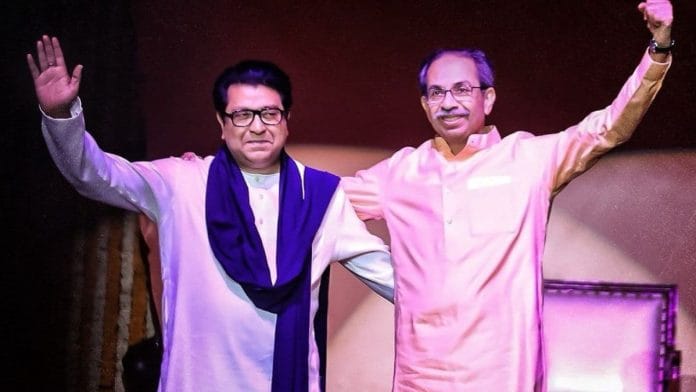Thank you dear subscribers, we are overwhelmed with your response.
Your Turn is a unique section from ThePrint featuring points of view from its subscribers. If you are a subscriber, have a point of view, please send it to us. If not, do subscribe here: https://theprint.in/subscribe/
I begin with two caveats: First, I am a proud Maharashtrian and a lifelong speaker of Marathi—my mother tongue. It is a language I grew up in – took my baby steps, laughed, cried, loved, grieved, lost & won, fell and rose again. It is a language which embodies a rich heritage of poetry, literature & culture. Second, I am politically agnostic and consider politics a necessary evil of democracy, and most politicians opportunistic & self-serving. So, what brings me to write this piece, is the making of my mother tongue a pawn in the political game. The fodder being the (now scrapped) move by Maharashtra Government to introduce Hindi as a mandatory third language.
Leading this storm, in the run-up to the municipal elections are – Raj Thackeray and Uddhav Thackeray—estranged cousins, abruptly united in using linguistic pride as a political rallying cry. Their noise about Marathi identity emanating from little genuine concern for the language, and more from political opportunism.
Marathi has never needed noisy defenders. It has endured and thrived because of its unmatched cultural legacy. It is the language of Sant Dnyaneshwar, Tukaram, Namdev, and Eknath—saints who spoke of devotion, inclusivity, and love. It is the language of P.L. Deshpande, Kusumagraj, and Vijay Tendulkar—writers and artists who contributed timeless literature – and an officially classical language now. Marathi theater was the pioneer of theater movement, was and continues to be the finest in the country. It is a language that has never sought to dominate but to inspire. To now use it as a tool for intimidation is not just ironic, it is just not done.
Let’s be clear- this sudden uptick in “Marathi pride” is not a cultural movement—it is a calculated strategy. It’s current chief exponents are trying to portray themselves as protectors of Marathi identity, whipping up linguistic nationalism to regain a political toehold.
What’s worse is the manner in which this is being done—by humiliating and assaulting autorickshaw drivers, small shopkeepers & vendors who don’t speak Marathi or haven’t put up signboards in it. These are mostly poor, working-class migrants trying to make ends meet in the maximum city. Instead of focusing on their living conditions or the challenges Mumbai faces, they’ve been turned into scapegoats in a linguistic witch-hunt. That’s not pride—it’s bullying. On top of that, the bullies are being anointed as ‘soldiers’ of Marathi language & culture! Soldiers don’t fight and torment poor, innocent people for their ignorance of language, they fight against injustice & tyranny in the tradition of great Maratha warriors of Chhatrapati Shivaji Maharaj. You can’t create love & ownership for anything by force, much less for a language, however dear to us.
Maharashtra’s legacy is not one of exclusion. Chhatrapati Shivaji Maharaj, that greatest of kings -often cited in such rhetoric—was an inclusive ruler, who respected ability over identity. Mumbai became a global city not because it closed its doors, but opened them to talent and toil from across the country. To now pit Marathi against non-Marathi in a city built on diversity is a betrayal of that legacy.
There is, of course, nothing wrong in encouraging the use of Marathi in public life. But it must be done with dignity and persuasion—not threats and fear. If the chief protagonists of this drama truly cared about promoting Marathi, they would have pushed for better quality Marathi education, funded regional arts and media, and promoted Marathi literature. But those are slow, invisible tasks—not vote-catching headlines.
The Marathi language must be celebrated, not weaponized. Respect for a language cannot be forced—it must be earned through inspiration. When Marathi films win awards, when youth choose to read and write in Marathi, when the language evolves with times—then we can speak of rejuvenation & revival. What we’re seeing now is not revival, it is regression.
In the desperation to earn political brownie points, emotions are being whipped up and reason given a go by. In the process, “Marathi Manoos” is being reduced, from a self-confident, resilient Mumbaikar to a caricature—angry, insecure, and intolerant. That’s not what a true Maharashtrian is. Mumbai’s citizens know when their sentiments are being manipulated. They will rightly ask: What has been done for the city? Are the roads better? Has healthcare improved? Are local schools functioning well? Language pride doesn’t fill potholes or remove garbage. Emotional frenzy doesn’t build infrastructure.
The truth is, you can’t build a political future on fear and division—not in Mumbai, nor anywhere else. The Marathi language is too rich, too dignified, and too beloved to be used as a political prop. It deserves better. And so do we.
These pieces are being published as they have been received – they have not been edited/fact-checked by ThePrint


